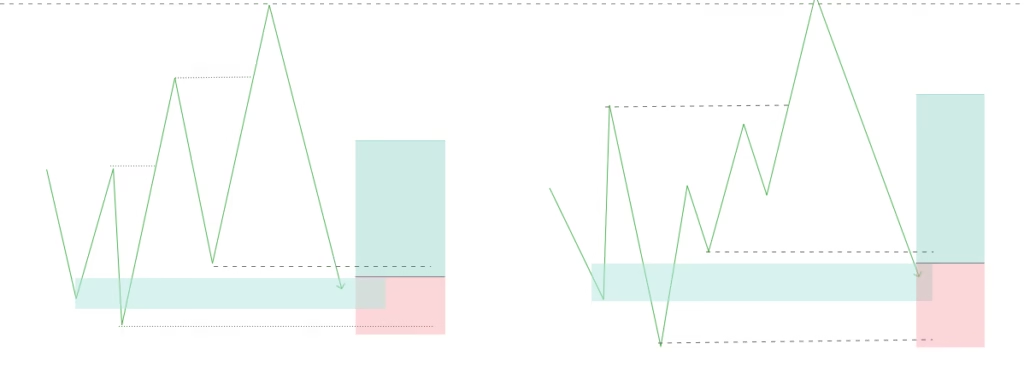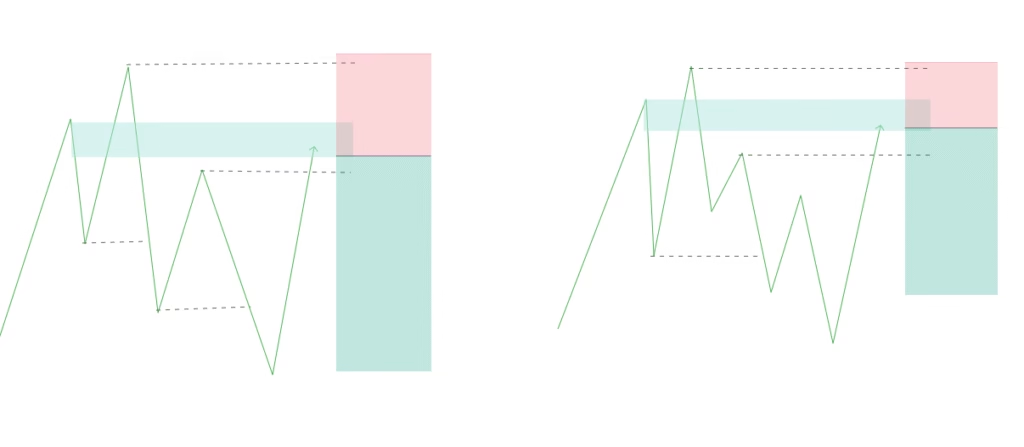The patterns ( Set-Up) on 1H-4h

Set Up Analysis,Validation & Execution
- Where does the price come from? (Market structure<range or trend>), HTF POI?
- What is the dealing range or Swing Structure?
- What is the price reacting to? ( a MSS on HTF, OB, FVG, HVN, Supply and Demand from Premium into Discount buy set up or from discount into premium sell set up ?? etc..
- Is pattern in premium or discount 1h and 4h and 1D?
- Flow in the directon of the trend ( not mandatory )
- Ensure there is no unmitigated demand or supply close to the POI
- Sentimental & Fundamental analysis Bias ( EdgeFinder or ChatGPT)
- Market Profile and Volume Profile Confluence for POI
- Validate SLQ ( 50%, Valid A,V shaped,3 candles Min)
- TP at 2RR
- Risk 1%
- Avoid news !

ORDERFLOW TRADING ( CRYPTO, FUTURES, GOLD)
🔎 Mean Reversion Model
- Short Setup: Price trades above previous day’s VAH → forms a sell tail rejection → you confirm with major liquidations (Rektv) → you short.
- Long Setup: Price trades below previous day’s VAL → forms a buy tail rejection → confirm with major liquidations → you long.
- Best environment: Ranging market → mean reversion to inside value area.
- Edge: High risk-to-reward since you’re entering after liquidity sweep + rejection, targeting mid/POC.
⚠️ The Weak Spot (Where You Can Get Trapped)
- Strong Trend Days:
- If BTC is trending (high OI expansion + strong CVD with price), those VAH/VAL tails can fail → price keeps pushing → your fade trade gets steamrolled.
- Example: CPI release, FOMC, ETF news → liquidation cascade doesn’t bounce back, it accelerates trend.
- Thin Liquidity Hours:
- If you fade during Asia low-liquidity, tails don’t always mean reversal, just chop.
🛡 How to Make It Safer
Here’s how to filter so you only take “high probability fades”:
- Check OI Behavior
- If OI spikes with liquidation wick → real trap → fade works.
- If OI decreases → liquidation flush complete → likely reversal.
- If OI keeps climbing with price → strong trend → don’t fade.
- Check CVD
- In a fade setup, you want CVD to fail to confirm price extremes.
- Example: Price breaks above VAH, but CVD doesn’t make new high → good short.
- Session Context
- Fades work best in ranging sessions (Asia / early London).
- Breakouts/trends dominate in NY session with news flow.
- Target Management
- Don’t always aim for full POC return. Sometimes price only retests VAH/VAL and rejects again.
- Partial TP at mid-value keeps equity curve smoother.
Reading the Initial Balance (IB)
The Initial Balance (IB) = the range of the first 1 hour of the session (often London or NY depending on your focus).
How it guides the day type:
📌 Balanced Day (good for fades)
- Price trades mostly inside IB.
- Both IB high/low respected multiple times.
- OI is steady, not expanding aggressively.
- CVD swings both ways (no one-sided pressure).
👉 Your fade setups (tails at VAH/VAL with liquidation) have highest probability here.
📌 Trend Day (danger for fades)
- Price extends IB early and holds outside.
- OI expands consistently in direction of breakout.
- CVD keeps trending with price (no divergence).
- Pullbacks shallow, buyers/sellers absorbed quickly.
👉 Here, fading is dangerous. Better to switch to breakout continuation strategy.
📌 Neutral Day (fade early, watch later)
- Price first breaks IB one side, then rotates across to the other side.
- Often driven by news.
- OI choppy, CVD also whipsaws.
👉 Fades may work early, but after second IB break, expect volatility.
⚙️ How You Combine It
- Balanced IB day = go hunt your tails + liquidation fades at VAH/VAL.
- Trend IB day = don’t fade, shift mindset to scalping pullbacks in direction of trend.
- Neutral IB = take early fade, but watch for full rotation.
📘 BTC Orderflow Scalping Playbook
Setup 1: Fade-Tail Model (Balanced Day)
Objective: Fade trapped traders at extremes (VAH/VAL).
Best Market Type: Balanced / rotational days.
Checklist:
- Price trades outside yesterday’s VAH/VAL.
- A liquidation cluster (Rektv) fires at the extreme.
- Price shows tail rejection (footprint absorption, low follow-through).
- OI behavior:
- Drops = forced liquidation, trap → ✅ good fade.
- Rises = aggressive new positioning → ⚠️ danger of trend day.
- CVD behavior:
- Price new high/low but CVD divergence = ✅ good fade.
- CVD trending with price = ⚠️ no fade.
Execution:
- Enter at/just inside tail after liquidation cluster.
- Stop: just beyond tail (low risk).
- TP1: Mid value.
- TP2: POC.
- Trail remainder if price stalls at POC.
Setup 2: Trend-Continuation Model (Trend Day)
Objective: Join momentum early and scalp pullbacks in the direction of imbalance.
Best Market Type: Trend days (news-driven, IB breakout holds).
Checklist:
- IB Breakout: Price extends beyond IB high/low in first 2–3 hours.
- OI behavior: Expanding consistently with price = strong conviction.
- CVD: Trending in breakout direction, no major divergences.
- Liquidity Check: Rektv shows shorts/longs liquidated into breakout, but price holds and accepts outside range.
- Footprint confirmation: Absorption on pullbacks (e.g., big sell delta absorbed in uptrend, no downside continuation).
Execution:
- Entry 1: After IB breakout retest (acceptance).
- Entry 2: On pullback to micro-POC / single print imbalance inside trend.
- Stop: just inside prior balance/IB.
- TP1: 1–2x risk.
- TP2: Next liquidity cluster / range extension (measured move).
- Trail if OI still expands with move.
🧭 How to Know Which Setup to Use
This is the decision filter:
- Check Initial Balance (IB):
- Price stays inside IB = likely Balanced → use Fade-Tail model.
- Price extends IB and holds = likely Trend → use Trend-Continuation model.
- Confirm with OI + CVD:
- OI rising + CVD aligned = Trend → Setup 2.
- OI dropping/flat + CVD divergence = Balance → Setup 1.
📘 BTC Daily Trading Plan (Orderflow, Exocharts)
1️⃣ Pre-Market Prep (Before 4am IB Lock)
- Mark yesterday’s VAH, VAL, POC (from daily profile).
- Mark today’s developing IB high & low (first hour of trading).
- Note key news events (macro, Fed, BTC ETF, etc.).
👉 These give you your “map” for the day.
2️⃣ Classify Day Type (After 4am, once IB is set)
Step 1: Where is price relative to yesterday’s value?
- Inside → possible balanced day.
- Above VAH or below VAL → possible trend day.
Step 2: What does IB show?
- Price rotating inside IB → Balanced.
- Price breaks IB and accepts outside → Trend.
Step 3: Confirm with Orderflow (Exocharts)
- OI expanding + CVD aligned with price → Trend Day.
- OI flat or dropping + CVD divergences → Balanced Day.
3️⃣ Trading Rules by Day Type
A. Balanced Day (Mean Reversion Focus)
🎯 Main Weapon: Fade-Tail Model
Entry Rules:
- Wait for price to tag yesterday’s VAH/VAL OR today’s intraday VAH/VAL.
- Watch for sell/buy tail rejection on footprint.
- Confirm with:
- 🔻 OI dropping (forced liquidation, not new trend).
- 🔄 CVD divergence (price makes new extreme, CVD fails).
- 💥 Rektv cluster fired at extreme.
Execution:
- Enter fade trade.
- Stop = just beyond tail (tight risk).
- TP1 = back to mid/IB.
- TP2 = POC of yesterday/today.
- If price stalls, exit remainder at POC.
Rule: Prioritize yesterday’s VAH/VAL over intraday levels (Tier 1 > Tier 2).
B. Trend Day (Momentum Focus)
🎯 Main Weapon: Trend-Continuation Model
Entry Rules:
- IB breakout + acceptance outside yesterday’s VAH/VAL.
- OI expanding + CVD trending in breakout direction.
- Rektv shows liquidation against breakout side (trapped traders).
Execution:
- Entry 1: On IB breakout retest.
- Entry 2: On pullback to micro POC or imbalance left by breakout.
- Stop = just inside IB or prior balance.
- TP1 = 1–2x risk.
- TP2 = next daily/weekly liquidity pool (or 1.5x IB range extension).
- Trail final portion with delta/OI momentum.
Rule: No fading tails on confirmed trend days.
4️⃣ Intraday Management
- Re-assess after each major session open:
- London → confirm balance or trend.
- NY → watch for second breakout or continuation.
- If you’ve already hit 2R profit → reduce risk size for next trades.
- If you hit max daily stop (e.g., 2 losses) → stop trading.
5️⃣ Daily Workflow (Quick Checklist)
- Mark levels (yesterday’s VAH/VAL/POC, today’s IB).
- Classify day type (Balance vs Trend) using IB + OI + CVD.
- Choose weapon:
- Balance → Fade tails with liquidations.
- Trend → Join breakout continuation.
- Confirm entry with orderflow (OI, CVD, Rektv, footprint).
- Execute & manage risk:
- Tight stop at tails/IB.
- Scale at POC or extension levels.
- Trail only with strong OI/CVD momentum.
- Review EOD: Save screenshots of trades, note day type, what worked/failed.
✅ With this, you’ll have a repeatable routine:
- Start at 4am → mark levels, classify day, pick strategy.
- Trade only high-probability fades on balance days or continuations on trend days.
- Avoid overtrading intraday tails unless all confirmations align.